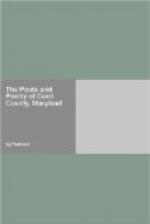“Bring back the joyous hopes of youth!
The faith that knew no flaw of doubt!
The spotless innocence and truth
That clothed my maiden soul about!
Bring back the grace of girlhood gone,
The rapturous zest of other days!
The dew and freshness of the dawn,
That lay on life’s untrodden ways—
The glory that will shine no more
For me on earthly sea or shore!
“Call back the sweet home-joys of old
That gladdened many a Christmas-tide—
The faces hidden in the mould,
The dear lost loves that changed or died!
O, gentle spirits, gone before,
Come, from the undiscovered lands,
And bring the precious things of yore
To aching heart and empty hands;
Keep all the wealth of earth and sea,
But give my lost ones back to me.
“Vain are my tears, my pleadings vain!
O, roses, drifting with the tide,
To me shall never come again
The glory of the years that died!
Thro’ gloom and night, sweet flowers, drift
on—
Drift out upon the unknown sea;
Into the holy Christmas dawn
Bear this impassioned prayer for me:
O, turn, dear Lord, my heart away
From things that are but for a day;
Teach me to trust thy loving will,
And bear life’s heavy crosses still.”
NATHAN COVINGTON BROOKS, A.M., LL.D.
The following sketch is principally from the Third Volume of Biographical Sketches of Eminent Americans.
“Nathan Covington Brooks, the youngest son of John and Mary Brooks, was born in West Nottingham, Cecil county, Maryland, on the 12th of August, 1809. His education was commenced at the West Nottingham Academy, then under the charge of Rev. James Magraw, D.D., and subsequently he graduated as Master of Arts, at St. John’s College, Annapolis, Md. His thesis was a poem on the World’s Changes. Diligent and persevering in his studies, his rapid progress and high attainments won the regard of his teachers, while his amiable manners endeared him to his classmates. While his principal delight was in the study of the Classics, he devoted much attention to mathematics and other studies. Like many other writers, some of his earliest efforts were in verse. Indeed it may be said of him, as of Pope, that he ‘lisped in rhyme.’
Though we have no Shakespeares, or Miltons, or Byrons, there is no scarcity of literary amateurs who, in their hours of recreation and dalliance with letters, betake themselves to poetry as an amusement for their leisure hours or a solace amid the rude trials of life. High in the rank of these writers of occasional poetry stands Dr. Brooks. Nature, in all her forms, he has made the subject of close observation and profound reflection, and in looking at Nature, he has used his own eyes and not the spectacles of other writers. He has a keen relish for the beautiful, and a deep sympathy with the truthful and the good. His taste, formed on the finest models, has been ripened and chastened by a patient study of the great monuments of antiquity. His thoughts seem to be the natural development of his mind; and his words the unstudied expression of his thoughts. The music of his verse reminds us sometimes of the soft cadences of Hemans, and not unfrequently of the mournful harp of Byron.”




